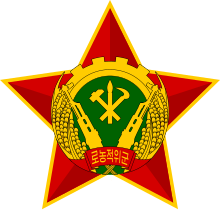The Worker-Peasant Red Guards (WPRG; Korean: 로농적위군), also translated as Workers and Peasants' Red Militia (WPRM),[2] is a paramilitary force in North Korea. It is the largest civil defense force in North Korea. It is not only under State Affairs Commission (until 2016 National Defence Commission) and Ministry of Defence control, but is also attached to the Workers' Party of Korea under its Military Leadership Department. It is thus responsible to the Supreme Leader in his capacity as Supreme Commander of the Armed Forces.
| Worker-Peasant Red Guards | |
|---|---|
| 로농적위군 | |
 Emblem of the Worker-Peasant Red Guards | |
| Founded | January 1959 |
| Country | |
| Allegiance | Kim Jong Un[1] |
| Type | Paramilitary militia |
| Role | Civil Defense |
| Size | 5 million personnel |
| Colors | Front:
Back:  Regimental standard Regimental standard Banner used by militia units |
| Korean name | |
| Chosŏn'gŭl | 로농적위군 |
| Hancha | 勞農赤衛軍 |
| Revised Romanization | Ronongjeogwigun |
| McCune–Reischauer | Ronongjŏgwigun |


The militia is organized on a provincial/city/town/village level, and structured on a brigade, battalion, company, and platoon basis. The militia maintains infantry small arms, with some mortars, field guns and anti-aircraft guns and even modernized older equipment such as multiple rocket launchers like the BM-13 and older Ural D-62 motorcycles, although some units are unarmed indicating status as logistics and medical units.[3] Its strength is estimated at 5 million personnel.[4]
History
editThe organization was established In order to make up for the shortage of troops as the Chinese troops that participated in the Korean War withdrew in April 1958, North Korea disbanded the Self-Defense Forces, previously under the command of the Ministry of Social Security, and on 14 January, 1959 the organization was formally established with workers, farmers, intellectuals, and students joining it, and had a force of 500,000 people.[5][6] At first, they were required to receive military training while working for a living, but in 1962, in accordance with the policy of arming the entire population, the organization was expanded to include men aged 18 to 45 and single women aged 18 to 35. In 1971, the applicable age for the Workers' and Peasants' Red Guards was extended to 50 years old, and all men and single women aged 17 to 60 who were not transferred to the prison guards were targeted for formation, and it continues to this day. They were also widely mobilized to help with reconstruction projects following the mass destruction that occurred during the Korean War. In September 1970, the North Korean government established the Red Youth Guards as a youth wing of the unit. The name ‘Worker-Peasant Red Guards’ first appeared at the military parade commemorating the 65th anniversary of the founding of the Party on October 10, 2010, and thereafter North Korea began calling it the ‘Worker-Peasant Red Guards’.[7]
Equipment
editDuring a parade in September 2023 elements of the force paraded in what appeared to be truck mounted 122mm rockets tubes disguised as civilian vehicles.[8]
See also
editOther nations:
- Red Guards (Russia) (Soviet Union)
- China Militia (China)
- Combat Groups of the Working Class (East Germany)
- Workers' Militia (Hungarian People's Republic)
- Volunteer Reserve of the Citizens' Militia (Polish People’s Republic)
- People's Militias (Czechoslovakia)
- Patriotic Guards (Romania)
- Territorial Defence (SFR Yugoslavia)
- Bolivarian Militia of Venezuela
- Committees for the Defense of the Revolution (Cuba)
References
edit- ^ "North Korean military takes oath of loyalty". www.enca.com. Archived from the original on 17 September 2016. Retrieved 25 October 2017.
- ^ Scalapino, Robert A.; Lee, Chong-sik (1972). Communism in Korea: The society. University of California press. p. 948. ISBN 9780520022744.
- ^ Bermudez (2001), pg 4–5.
- ^ Oh, Kongdan; Hassig, Ralph C. (2004). North Korea through the Looking Glass. Washington: Brookings Institution Press. p. 231. ISBN 978-0-8157-9820-0.
- ^ "労農赤衛軍" (in Japanese). Uriminzokkiri. 7 September 2023. Archived from the original on 7 September 2023. Retrieved 29 September 2023.
- ^ "Golden Jubilee of Worker-Peasant Red Guards Marked", KCNA, 13 January 2009
- ^ Benjamin R. Young (17 September 2021). "Guns in one hand: Kim Jong Un's revitalization of the Worker-Peasant Red Guards". NK News. Retrieved 29 September 2023.
- ^ Payne, Stetson; Rogoway, Tyler (9 September 2023). "North Korea Debuts Rocket Launchers That Appear As Civilian Trucks". The Drive. Retrieved 10 September 2023.